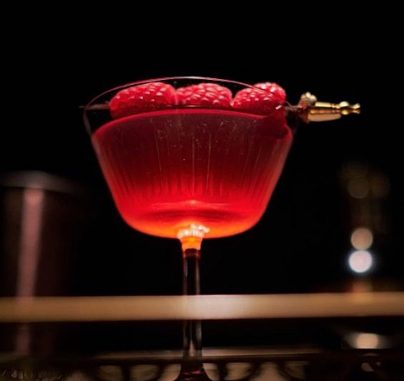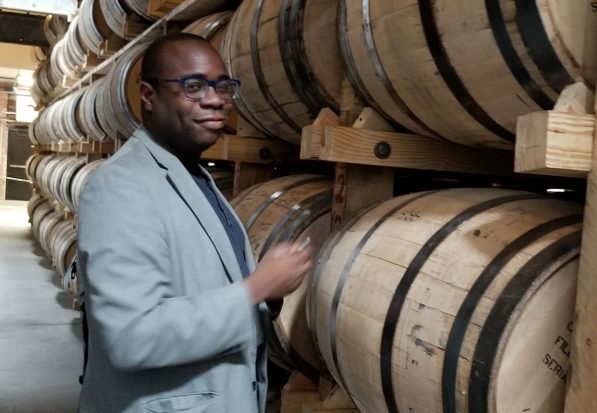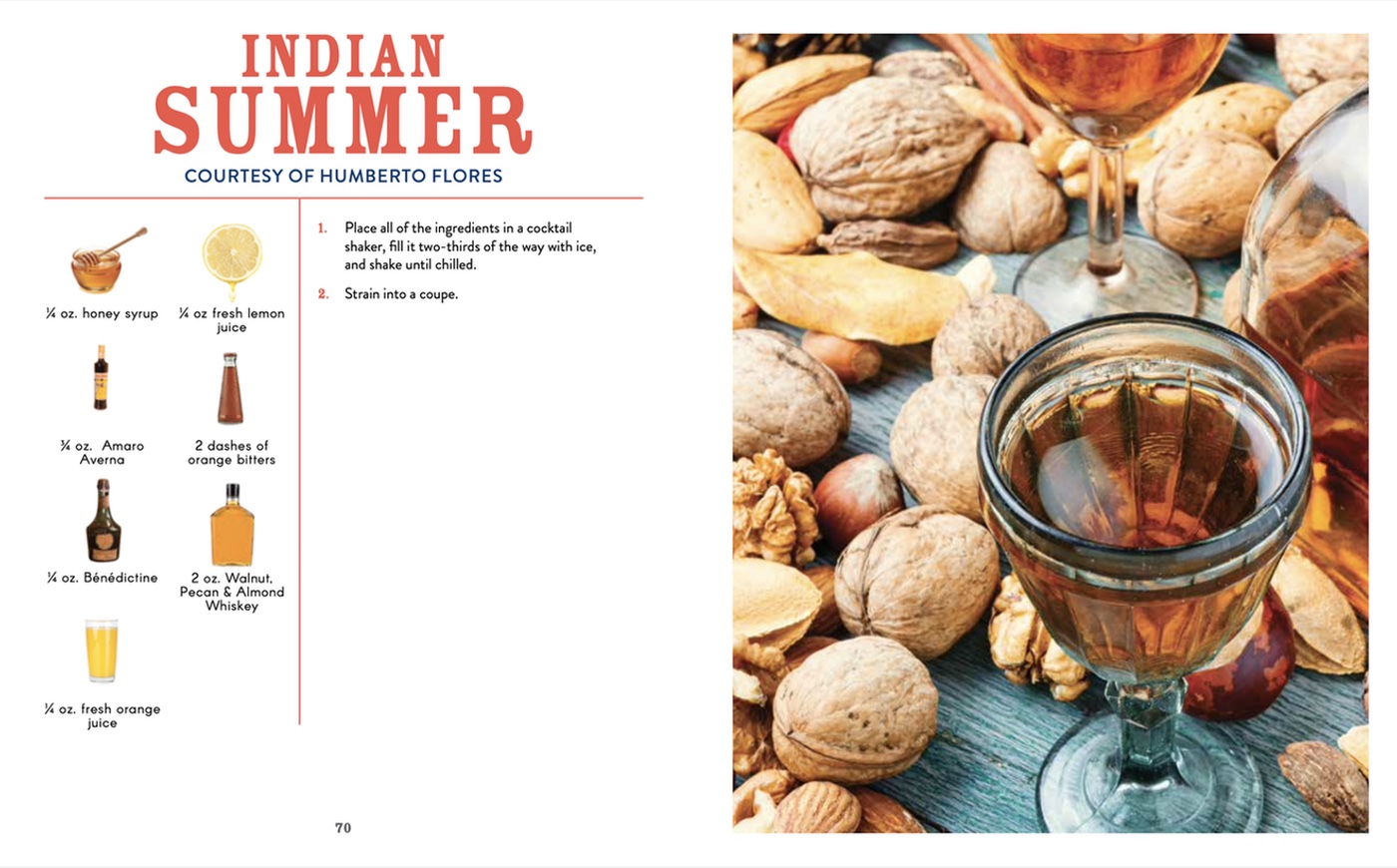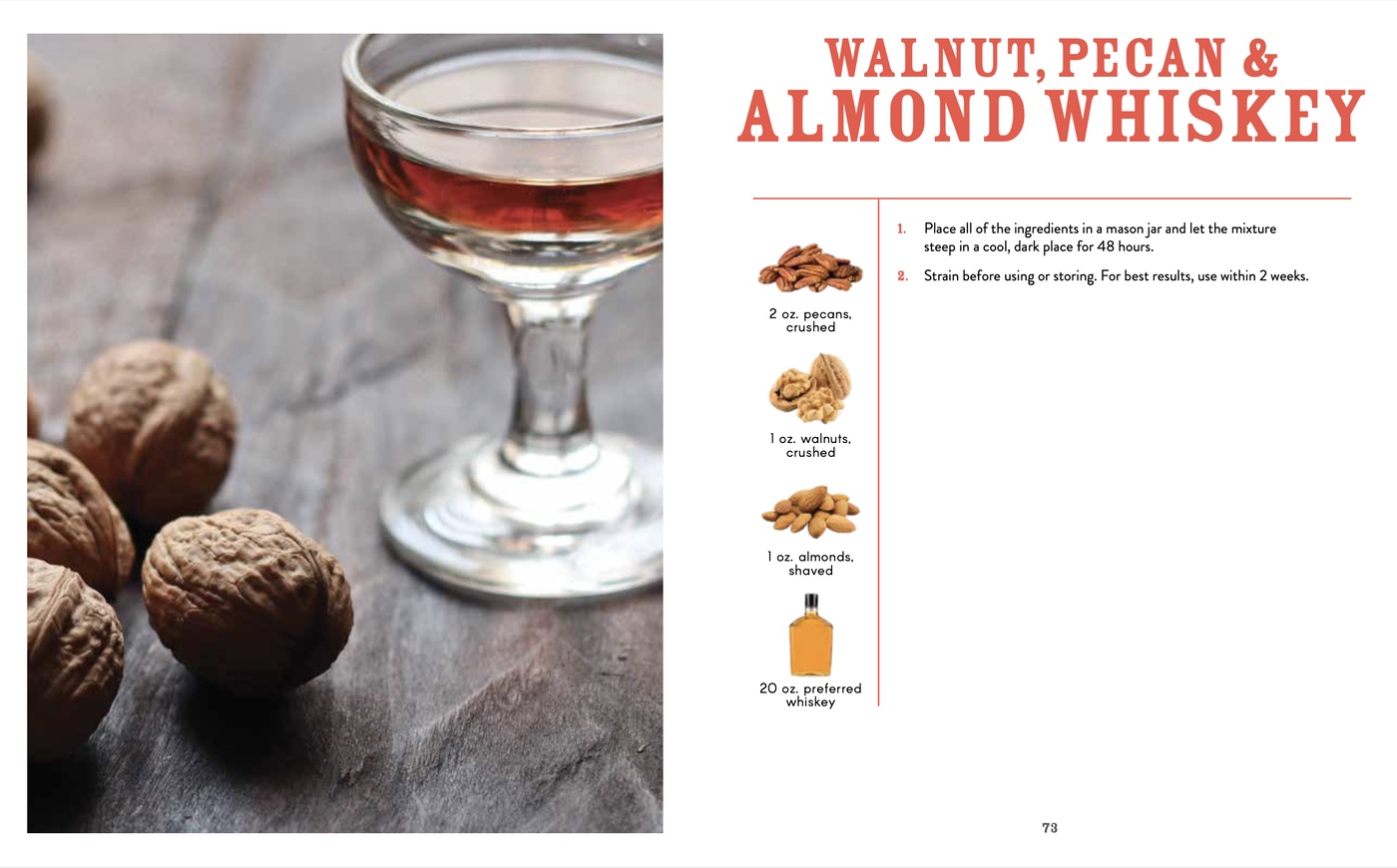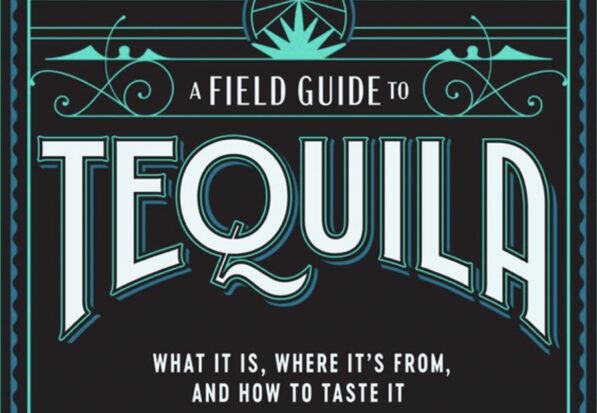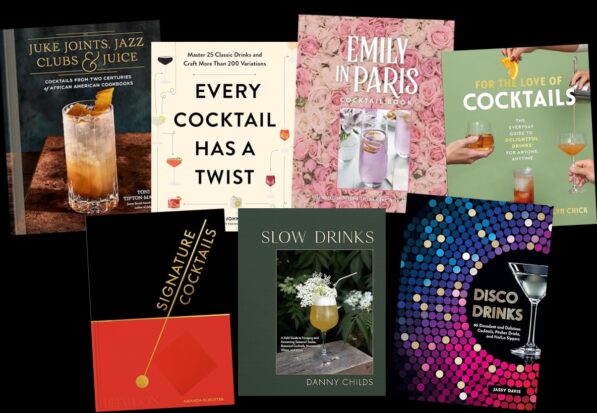Infusions are a simple way to add a flavour hit to any spirit buy often we are left wondering what to make but also how to use them.
We’re here with author Kurt Maitland to talk about his new book, The Infused Cocktail Handbook which can easily help you easily be creative with flavour at home.
The Infused Cocktail handbook is available through amazon.com
Interviewer:
Infusions are a simple way to add flavour to any spirit, but often we are left wondering not only what to make, but also how to use them. We're here with author, Kurt Maitland, to talk about his new book, The Infused Cocktail Handbook, which can help you easily be creative with flavor at home. Thanks for joining us, Kurt.
Kurt Maitland:
My pleasure.
Interviewer:
Now, what made you want to write a book on infusions?
Kurt Maitland:
When I was writing my first book called Drink... it's this massive four-and-a-half pound book of cocktails... I put in an extensive section on infusions. As I was researching the book and trying to figure out what cocktails to put in, I found myself not really interested in putting in a lot of mocktails. I wanted to find something that was a bit more creative that, let's say, had a non-alcoholic aspect and an alcoholic aspect. So, you could do an infusion with fruit and you could infuse it with vodka or you can infuse it with water: your choice; so it was gave me a healthy option within the course of the book.
So, with this book because I was interested in infusions, my publisher reached out to me and asked me if I wanted to expand on what I had done. There aren't that many books that focus strictly on infusions as far as cocktails go, so I thought it was a great idea and I was happy to do it.
Interviewer:
Why do you think that is the case that there haven't been a lot of books that have looked at this topic?
Kurt Maitland:
I think that a lot of infusions you're going to get are... as far as what people will buy, you get the healthy option, which will be all by itself, but it's not necessarily until recently the most, for lack of a better word, sexy cocktail. It's not considered the classic. It's not like what you get from the Savoy Cocktail Book or the things people would really go back in time to figure out a recipe for. So they weren't vintage; they weren't even new classics, but for me, they were a good change of pace. And while you'll find infused cocktails in other books, you don't find many books just focusing on it.
Interviewer:
Your foreword has been written by Adam Sachs. How did that come about?
Kurt Maitland:
COVID and rekindling an old relationship. Adam and I went to college together. He was a year ahead of me and so I knew him before he became a famous writer. I knew him as a great writer. I always tell people he's a much better writer than I am. And we were chatting while we were all in our respective lockdowns over the phone and I was working on this book and I'm like, "Hey, you know what? Adam, can do me a solid, are you interested in writing the foreword for this book?" I thought he'd be perfect because of his place in the food world and, certainly, being able to see the connections between infusions and cooking.
Interviewer:
He's not much of a cocktail guy though, from what I understand.
Kurt Maitland:
No. I understand his take is that if you come home from work and you want to drink, it's much easier to open up a bottle of wine or pour some whiskey and just have a drink. Cocktails take a bit more time. It's very rewarding, but there's a time element. If you've been working and you really want to drink right now, a glass of wine is much faster.
Interviewer:
In that foreword, he mentions that infusions turn everyday ingredients into something grander than the sum of their parts. Is that how you view them?
Kurt Maitland:
Yes. Something is simple as adding lemon and blueberries, the same blueberries you get from the store to a Mason jar of water and just letting them sit for a day or two is an entirely different flavour than you get from the water by itself, the lemon and the water, or the blueberries and the water, and it's not hard. That's the funny thing about infusions is the only aspect that takes effort is just the time: you have to wait. It's just like, "Oh, I can't drink this right now," but if you do it right, you can make the components that you... fuse components you make, you can use those to make several other drinks, different cocktails, little refreshing spritzers, all those kinds of things, which are pretty cool.
Interviewer:
Now, have you written this book as much for food nerds as it is for cocktail connoisseurs?
Kurt Maitland:
Yes. Because my feeling was that a food nerd would be more inclined to take those extra steps because they've already done that in their world when they're making meals for friends. Anybody is a food nerd who actually engages in cooking. It's all the concepts of infusions fall into what they already do, so it's just like, "Here." Just take what you do and the prep work you do to make a great meal for friends and family, move it over to making unique cocktails”.
Interviewer:
Infusions could theoretically be thought of as the ultimate cocktail project. They aren't necessarily labor intensive as they are time intensive, but they can create something quite unique. Is that the way you think of them?
Kurt Maitland:
Definitely. The thing is with as we're talking about the whole time aspect, it's like there are quick cocktails you can make, but it's nice when you have these ingredients or these things you've already prepped that are ready to go. So if you're making a three-ingredient cocktail and you have the rum you've done a fat wash and salt wash with and you want to make something, you make it like that. It's like all the time's on the back end, not the front end. I think that you can make fancier and fancier cocktails because you've done that work on the front end. Because again, the biggest thing with the infusion is really the time.
There are some of the infusions that require cooking, but as far as the ones that are strictly you take these ingredients and put them into a spirit, or into oil, or draw something out of it, that stuff you can keep it at the ready for when you want to make something. You could definitely get fancier and fancier because the assumption is people will make their own modifications of these recipes. There's a recipe in here where someone's doing, as I've mentioned, a salt fat wash off of peanuts. Somebody that's enterprising might change this type of nut because they like some nut better than another. You know?
A lot of people, they want to do it off of macadamias instead and that will give them an entirely different flavour, but it's the same recipe.
Interviewer:
Everyone talks about flavour. How important is it to constantly raise the bar when it comes to the flavours we consume in everyday life?
Kurt Maitland:
I think it's very important because it keeps one from getting bored. And in regards to cocktails, I think the best way, or the way I think of it is, I remember how cocktails were when I was in college. And when I was in college, unless you were in a fancy club or a fancy hotel, your cocktail options weren't that great. If you asked for anything fancy, somebody's pulling out some dusty book from under the bar and they're perusing it to find what you're asking for. Or they had things like they had pre-mixes such as like, "Here. Here's our margarita machines," looking like a slurry, churning away at the end of the bar.
You step away from that and then you actually make a fresh margarita or a fresh daiquiri, and it's funny how much more the flavour pops because you've just simply got fresh ingredients. You got, let's say, a rum or whiskey that was two steps better; you use the fresh lemon for what you were doing or a fresh lime and you use it right then and there, it's just so much better. It's just a lot more zest to what you're drinking.
Interviewer:
With everyone spending so much time at home, as we all have, do you think people are more open to experimentation than they were a year ago?
Kurt Maitland:
Yes. I think that with the world, hopefully, slowly opening up, everybody's going to want to get out and do things. But I still think that what they learned while stuck at home, whether it was a new way to cook or different things to drink that they could enjoy, I think the ability to experiment with cocktails...
Because I think normally, you'd experiment out of the home. You go to a bar and maybe you'd talk, you have a favourite bartender. You say, "Hey, I'd like a cocktail, I'd like this stuff in it," and they'll make you a cocktail and the bartenders done the experimenting. But for a year plus you've been deprived of the bartender's company and so all you had was what you could get your hands on and do on your own. So, I think that that opened up people to different flavours, different possibilities, things they wouldn't have thought of and it became interesting; so they'd like to expand that and move on further in that.
Interviewer:
When you were writing this book, were you writing it for people who had some cocktail knowledge? Or were you writing it for people who maybe have never infused before and are only just beginning their cocktail journey?
Kurt Maitland:
I would say this book was 70/30. So, 70% for people who had made cocktails before and 30 for people who were taking their first steps. I would say if you were just getting into cocktails, my first books, you should get into that first.
So Drink, it has something like 1,100 cocktails broken down by type of spirit, so it's one where if one was a vodka fan... I'm a whiskey person, but if one was a vodka fan or a rum fan, they can focus on the cocktails that feature the spirits that they loved, and then from there move on, and they can modify stuff because there's some cocktail recipes that can use either spirit. There are ones where you can replace whiskey with rum and vice versa. That one's probably the better one for somebody just starting on cocktails, but this one was if a person was starting, they could definitely use this and get the concepts for infusing and definitely make good cocktails, but it's a bit harder because they have a little extra bar to cross.
Interviewer:
Did you think it was important to not only talk about the infusions they could make, but also include the cocktails?
Kurt Maitland:
I saw that it would be a good guide, so it's giving them the infusions. It's like giving them the keys to the car, but the car has two flats. You need some idea of what's it going taste like, so if we give a sample cocktail that you can use the infusion for, that at least will put you on the road to further experimentation and you'll taste it and you'll modify it.
My expectation with any cocktail book is that you're going to try the recipes in the cocktail book and then you're going to modify it. Kind of what you do with cooking. Maybe you get a chili recipe or a roast chicken recipe and you'll try it exactly like the book says. Next time you do it you're like, "Maybe I want it with a little bit less salt," or, "Maybe I want it with some of this," or, "I want these spices versus those spices." All these things are kind of stepping stones and so I fully expect people are going to modify and move on from whatever I give them.
Interviewer:
What would your favourite infusion be?
Kurt Maitland:
One that's most memorable to me and it's a combo of its simplicity like, "Why didn't I sink of this?" and its efficiency as far as the ease of use. There's a cocktail in the book from the Drip Bar in Hamburg where they do what they call a Salted Manhattan. I like Manhattans as a drink. All they did was take a coffee craft, a large one, fill up where the coffee would go with salted peanuts, the same ones you get in the store, and then they slow-dripped either rum or whiskey through the peanuts, basically creating a simple salt and fat wash.
So the whiskey collected at the bottom; it has a bit of the oil from the peanuts; it has some of the salt. They take that whiskey and use it to make other cocktails, but especially a Salted Manhattan. I think that's wonderfully novel; easy to do. No, it wouldn't be... It not much trouble. All you need is a coffee craft and some peanuts and spirits and it gives you a lot of options in other cocktails you could make.
Interviewer:
People probably don't think of infusions as being part of a cocktails bar's arsenal. How important do you think they are?
Kurt Maitland:
I think that if you want to take the next step in, quote/unquote, your cocktail journey... Like in whiskey, there's always talk of your whiskey journey, which is simply what whiskey did you start with and what have you learned, and what more do you want to learn, and what are you happy with?
With cocktails, it's like, yeah, there's a world of three and four ingredient cocktails and you never have to leave that world. But if you want to make something a bit more unique, you want to have something where you can put your flare, I've thought infusions were a good way to do it. And also, the nice thing about them is that they're a bit more first subtle than a normal cocktail because you can always make it in a different way, modify the ingredients, don't have alcohol, change the alcohol you're using. It's just a big, big world to play in once you get started.
Interviewer:
A lot of the bars that have contributed to this with you have actually been London bars, but you're American. How does an American end up becoming such an Anglophile?
Kurt Maitland:
Well, there's two things. Amusingly enough, I am actually an Anglophile. I would think it's years of PBS showing BBC programming when I was a kid. When I was a kid I had this crappy little black and white TV... this is me the late 70s into the 80s... and all of the British shows that got bought by our public television networks were always on, so I grew up as a young kid watching EastEnders; I, Claudius; Doctor Who; Sandbaggers; Are You Being Served? I spent a lot of time watching British TV, which is why when I go to the UK, the accents don't really throw me because I'm just so used to hearing them.
But as far as the bars, it actually ended up more from where I happened to be when I started writing. I started writing it while I was on vacation in the UK. I had this great chat with Sukhinder Singh, co-owner of the Whiskey Exchange, and Sukhinder likes cocktails. So I said, "Well, Sukhinder, this is your town, suggest some places I should go to when I'm working on this book." So, he gave me a start and I hit some London bars. Some of the London bars that I went to hit me to other London bars where even if I couldn't visit them, they're like, "Hey, reach out to these people and talk and see if they want to participate."
So, I ended up getting a decent amount because I was on vacation; I'm running around London and that was part of it. And so, in a weird way, the book tracks part of the trips I made in 2019 and 2020, so there are bars from London, Hamburg, Belfast, Baton Rouge, New Orleans, New York. I live in New York, so that doesn't count, but I happened to go to New Orleans early last year, pre-COVID, and I got some amazing bars and amazing contributions there. Not to take away from the bars, the stuff I got from Germany and from the UK because that's really...
I try to change it up each time or at least add new people to the mix because I am not a bartender by trade. I like drinking and I can make cocktails, but it's a different world when you have a pro. So, I wanted them to give feedback and them to talk about what they were excited by and what interested them in to give some insight to the person who's getting into cocktails or wants to improve what they do.
Interviewer:
Which of the bars that you visited would you say was your favourite?
Kurt Maitland:
Good question. It might have been the Artesian. I love them all, but the Artesian I think I went back to three or four times in the course of the book. I think twice while I was in London and I happened to be in London again early 2020, so I went back again. So, right now, that's where I'm at. But then, I've been on lockdown. I haven't been doing a bar in another country in over a year at this point, so let's see what happens when I go out again.
Interviewer:
Now, which do you think should come first, the cocktail you want to create or the ingredients you want to infuse?
Kurt Maitland:
Good question. I think in some level if you pick the cocktail first, the cocktail will lay out the ingredients and then you could work out what has to be infused to make the cocktail. But that said, if there's something you really want to work with because it happens that not every single possible infusion is documented in a book, it might be you want to start with the fruit or the possible infusion instead.
For example, my family's from the West Indies: another reason why I'm a bit of an Anglophile because they grew up with all the English traditions. My parents are from Trinidad. Let's say they wanted to do something with mango, it's like, "Okay, well fine. It's like maybe you cube up a mango, take out the seed and let it sit in the rum for a week and see what you got." You could taste that and fusion and then think about, what do you...? You think of it as a building block and what would you want to add to that? What would make it interesting? You know?
Is it too sweet? So what would you mix with it to tone down that sweetness, bring up other flavours? So, that's almost not an answer; it's like you can go either way. But I think definitely you could do it either way is probably the best answer. You can do it either way. If there's something you'd love to infuse, I'd say try it. You don't have to use that much spirit or that much fruit. You could do something small like a baby food jar, take a small amount of spirit, a small amount of the thing you want to infuse, put them together and let them sit for a while and just taste it. That way you could-
Interviewer:
Like a sample.
Kurt Maitland:
Exactly. And then see if, "Okay, do I like this? Is it worth doing a whole bottle of this or is something else I should be doing?"
Interviewer:
Distillers are experimenting much more with flavour themselves. Could infusions end up masking the distiller's intent?
Kurt Maitland:
I would say yes, especially in spirits with very strong flavours. My first book, I described vodka as the tofu of the spirits world, and that's not meant actually as an insult. It's just you can put anything with vodka. It's like there are a whole line of cocktails that are literally some fruit drink and vodka: Greyhounds, Screwdrivers, all of them. That's the way it works.
Interviewer:
Because it takes on the flavour so well?
Kurt Maitland:
Exactly. And in some respects, it's if you're starting out making cocktails, it's like I'd say something with vodka or highballs are the two fastest ones you can make because they're basically two ingredient cocktails. I think that it's more that I would be careful about what I picked to do my infusion list.
So me, personally, if I was doing an infusion like the Salted Manhattan infusion, I'm not using a spice rum for that. I'm not using any kind of quirky bourbon. I'm probably going to find a bourbon I like that's at a good price point, same with a rum, that hasn't been flavoured or it's standard in that regard, and let the infusion do the talking; let what I'm mixing it with do the talking. Because if you end up getting a really spicy rum... and this is my opinion, I could be wrong... and then you infuse it, you might end up with something that's a bit hard to take. I'd say you can definitely try it. I'd say use the baby food jar, a little bit of a spirit to test it and a little bit of something; just see how it works out and how the flavours work together.
Because another thing was infusions is, after a while, one flavour will overwhelm the other. That's why you don't want it sitting around, especially when it's something infused in a water. With spirits, not so much. Like we said, with vodka, vodka takes on the flavour of the... So that you can definitely let things sit in that. But yeah, definitely the interesting thing is with spirits, whiskey, vodka, gin, everybody's trying to change how things taste and introduce new flavours and in some respects up their game in regards to what they release. I think for purposes of doing an infusion, at least starting, you want to stick to something fairly basic, so then you know what you're dealing with and then you can experiment a little bit further as you get deeper into it.
Interviewer:
So almost like the plainest version of a particular spirit you can find?
Kurt Maitland:
Exactly. Yeah, it's like you're going to add the excitement when you do the infusion. You know?
Therefore, you're adding the flavour you want versus having too much extra input from the distiller.
Interviewer:
When somebody buys this book, how do you want them to use it? Should they dip in and out or is it better to actually do everything in order?
Kurt Maitland:
I think for this one they should definitely move around a bit. The nice thing about how it's laid out is that the Q and A's with the bartenders and bar owners are in the front. So I might say read that because what they're talking about and the things they say about their cocktails might tip you one way or another as the thing that you want to make; but also, it's broken up by spirit type like my first book was. So if you're a whiskey fan, dig into the whiskey section, or if you're a rum fan or you're a gin fan or an absinthe fan, find out those cocktails and dig into those and that's where you start.
I think it's important people read the Q and A's, not from anything I did, just simply to get a better sense of who the creators of the cocktails were and what they're thinking about and what they go through; what's their process because that just makes you better for when you're working on things.
Interviewer:
Are there some infusions that are more advanced than others?
Kurt Maitland:
Yes. There are some... I mean, they're not even necessarily hard, but they take a couple ingredients. I'd say the easiest infusion's simply one fruit and a spirit. Gooseberries and vodka, that's easy. Something in gin, easy. But every time you add another ingredient, you add an extra complication because, "How's it reacting with what I did? Did I add too much of this? Did it turn the overall infusion?" So yeah, definitely some are easier than others. I think just with cocktails, I think every time you add another ingredient your level of difficulty steps up a little bit.
Interviewer:
What is the main thing that you want people to take away from the book?
Kurt Maitland:
I want people to have fun with the book. I want them to use it to make things that they enjoy and they can share with their friends and their family. Because I look at it like I'm sharing something and the people who contributed to the book, they're sharing something. So, if this broadens their world as far as the cocktails they have access to and the things they can make and lets them be more creative, and three years from now, I'm talking to somebody who was looking at it and now they have a whole line of cocktails that they made off on their own, they're like, "Oh, I read your book and I did these amazing things." And it's not like I made them do anything. It's like they just got to be creative. I just basically showed them a new set of paints. You know?
And they went off and painted a couple of masterpieces without me. Hopefully, I get to taste these things when I go out.
Interviewer:
Do you like hearing stories from people about what they have been able to create with your books?
Kurt Maitland:
I do because it's funny, you write the thing... I love writing. I've always loved writing, but I got into writing books late. I write reviews. I write about whiskey. I interview people in the spirits' industry, but writing a book is a pretty time intensive labor because you keep going back and trying to chase down mistakes and make sure you got stuff right and follow up with people.
Bartenders work at night and it's like they'd sleep in the day. So then, all of a sudden it's like you have to like, "When can I get them and not be bothering them? When I'm trying to work, they're sleeping. When they're working, I might be doing something else." So you're trying to get this balance of getting what I need, giving them the space, and all those kinds of fun things. So it's great when after that's all said and done, someone tells me that, "Hey, I liked it," or, "I learned this thing." Because invariably, I'm going to have somebody telling me I made a mistake and I'm an idiot and I'm like, "That's fine." I definitely will cop to making mistakes. I'm human”. So I might as well get people telling me that they enjoyed it and it helped them do something, or it made them feel like they were a better cocktail creator.
Interviewer:
Can infusions be a simple way of achieving food pairings?
Kurt Maitland:
Yes. Let's say there was a cool dessert you were working on and the dessert use particular fruits, hey, maybe you do some kind of a fusion then some kind of drink that uses that fruit as well, or a fruit that complements what your dessert is, as well as ones that complement the entire meal. You could actually almost think of cocktails for each part of the meal.
You could think of, "Oh, hey, here's a cocktail for what we're serving as an appetizer, and here's a cocktail for what we're serving as a main course, and here's one we're doing for our dessert." You can do in different infusions maybe pulling one part of what that appetizer is, what the main course is, maybe one of the spices, maybe one of the fruits, maybe even the vegetable. Use that to create an infusion to go with, to pair with, what you're eating.
Interviewer:
Are there any dangers in creating infusions?
Kurt Maitland:
For the most part, no. The spirits? Because you're dealing... especially, you're dealing with alcohol, it'll kill most germs. I'd say that just like anything you'd make, these things aren't permanent. They're not going to keep forever. Also, keep in mind with the amounts that a bar makes, a bar makes more cocktails than the average person does. So, keep in mind how much you think you're going to use of whatever it is when you're making your infusion.
For example, if you live alone, making a large Mason jar's worth of an infusion might not be the best thing. You don't need that much. However, there are times where it's like if you're infusing something in a bottle of vodka, or a bottle of rum or whiskey... Yeah, that's fine because you're going to just go back to that bottle to use it as an ingredient for your cocktails, and you'll burn it out in a month.
Interviewer:
At the end of the book, you've written an ode to the bar industry and all that has been lost through the pandemic. Why was this important?
Kurt Maitland:
For me, I couldn't do what I've done without those bars. You know, I like, I like to think that I am smart and I know stuff, but the reality is, is that for years the information I've acquired and the knowledge that I've gotten, I've gotten them in bars talking to bartenders, talking to people, making cocktails, digging into what they do, and how they do it, and what are their influences. I couldn't do it without them, so I felt that they were so punished during the pandemic because they couldn't do their job.
Imagine you're a creator and you can't create beyond the fact, to add insult to injury, you can't just burn normal money and just make your money and be paid; you were stuck to where you were at home. Your skills, let's say they weren't atrophying, but they weren't the same as working in a bar under normal circumstances. And so, as much as I want people to enjoy my books, I want them to go back out to bars. And even if they go back up the bars and they're now a better informed consumer, go back out and patronise those bars. You can learn even more. You can learn this stuff that I didn't learn yet and they can teach you new tricks.
Interviewer:
All right. Well good, Kurt, thank you very much for taking the time to speak with us today. I assume that the book is available through all good booksellers?
Kurt Maitland:
That is the rumor. I know that it's... I mean, stateside, it's Amazon and Target, but I know that people have been able to order the book. It's slowly making its mark across the planet, so it can be. If it's not available, it can be free ordered. Certainly, people can feel free to reach out to me and tell me they can't find it and I will track down where the book should be. I'm happy to do that much.
Interviewer:
And you're on Instagram and socials?
Kurt Maitland:
I'm on Instagram. I'm on Facebook. I can give you my email. People can email me. I don't mind. Hopefully, it's good feedback that somebody would actually want to take the time to get my book. I'm at kurt@whiskeyselections.com. Whiskey with an E because I'm an American. But I understand I actually change it, not my email, but how I spell whiskey depending on what type of whiskey I'm talking about, which is quite the trick.
Interviewer:
It can be. Anyway, look, thank you very much.
Kurt Maitland:
Oh, my pleasure.
